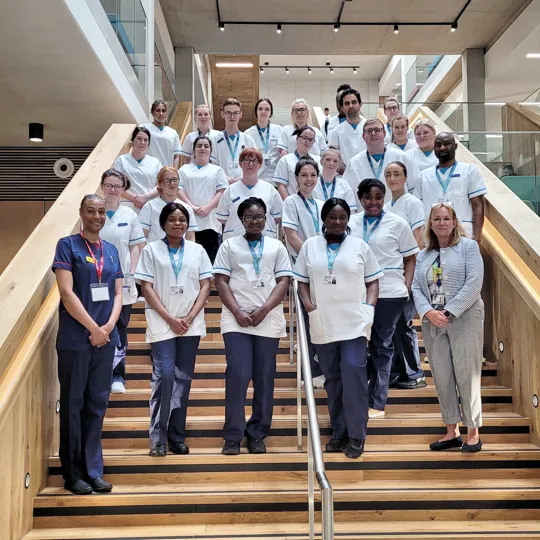February 2024
Blog | Bridging the gap: a new approach to nursing apprentices
By Marina Kendrick and Suzanne Smith
Share post:Read time: approx 4 mins
In May 2017 Nursing apprenticeships were introduced with higher degree-level apprenticeships in both Nursing and Allied Health introduced in the following years. The use of the Levy tax to support apprenticeship delivery opened a new stream of opportunities for employers working within the NHS, private and independent sectors within healthcare.
It enabled employers not only to recruit and train new staff, but also to develop current, highly-skilled, long-term employee by providing them with opportunities to gain a professional registered qualification, where previously the commitment to study and time out of employment would have impacted the employee’s financial situation.
But how can apprenticeship programmes surmount some of the other challenges of delivering a skilled healthcare workforce?
Some of the more nuanced challenges of delivering apprenticeships are around the added costs of apprenticeships, such as the backfilling of the nurse apprentice whilst they are at their place of study. There is also the challenge of managing suitable, well-supported placement opportunities as required by the Nursing and Midwifery Council (NMC) and The Health and Care Professional Council (HCPC) to meet appropriate proficiencies required to become a registered professional.

The first cohort of Nursing Associate apprentices in 2022.
There are huge opportunities for HEIs to work in collaboration with employer partners to provide tailored education programmes which match or exceed the needs of the student, learner and employer. Apprenticeships offer a delivery model where the employer can appropriately support the needs of the qualification and also the needs of their patients by using the work-based model of an apprenticeship.
The planning for new and emerging apprenticeships should be strategic, based on the NHS Long Term Workforce projections, with employer partnership working at its heart. It is this collaborative approach that we have seen at University College Birmingham grow healthcare registered degrees and apprenticeships, without compromising on quality.
Across the country, there is scope for higher education institutions (HEIs) to work with employers on offering unique and specialist placement opportunities, enhancing the learning experience of their apprentices. In Birmingham, these include Cygnet Health Care, an independent mental health and learning disability provider, Health in Justice (Practice Plus group, providing healthcare within the prison environment), and University Hospitals Birmingham and specialist NHS care providers, such as Royal Orthopaedic Hospital, and the Birmingham community hub working to support GP surgeries to develop their staff.
The bespoke blended delivery model supports the national provision, enabling apprentices from across England to enjoy a university experience whilst studying remotely. By utilising this delivery model as part of the HEI’s nursing offer, national placement partnership can enable the support of placement opportunities in mental health, adult, children and learning settings as part of the NMC requirements.
The tangible challenges of a shortage of nurses, in the context of wider challenges in the sector addressing the difficulties of a post-pandemic work, do mean that quick fixes and overnight miracles are not a reality. The combination of offering employer-focused and immersive learning experiences to both local and national employers, and a route to enhancing their workforce development that goes beyond the traditional academic settings of entry go a long way towards addressing the gap.
Learn more about apprenticeships at University College Birmingham or find our more about courses within our Department of Health.
Check out our latest news stories

Student chef Rohan takes runner-up spot in prestigious Toque d'Or competition
Rohan Bragg, a Birmingham College of Food-mentored student working towards his Professional Chef foundation degre…
Read more
Two nursing master's launched for community health and social care
University College Birmingham has launched a new MSc Adult Social Care Nursing, MSc Homeless and Inclusion Health Nursing an…
Read more
Strength of student voice recognised in National Student Survey 2024
University College Birmingham’s commitment to listening to the voices of its students has been recognised in the National…
Read more
New education centre to open thanks to joint university partnership
University Birmingham East is driven by a shared commitment to addressing challenges faced by children growing up facing di…
Read more
University launches government-funded pilot to upskill adult learners
The Introduction to Cyber Security and Introduction to Digital Marketing courses are part of the Modular Acceleration Pro…
Read more
Blog | Can I go through Clearing if I change my mind on my course?
There are many good reasons you might choose to access a course through the Clearing system, so don’t think of it as second…
Read more